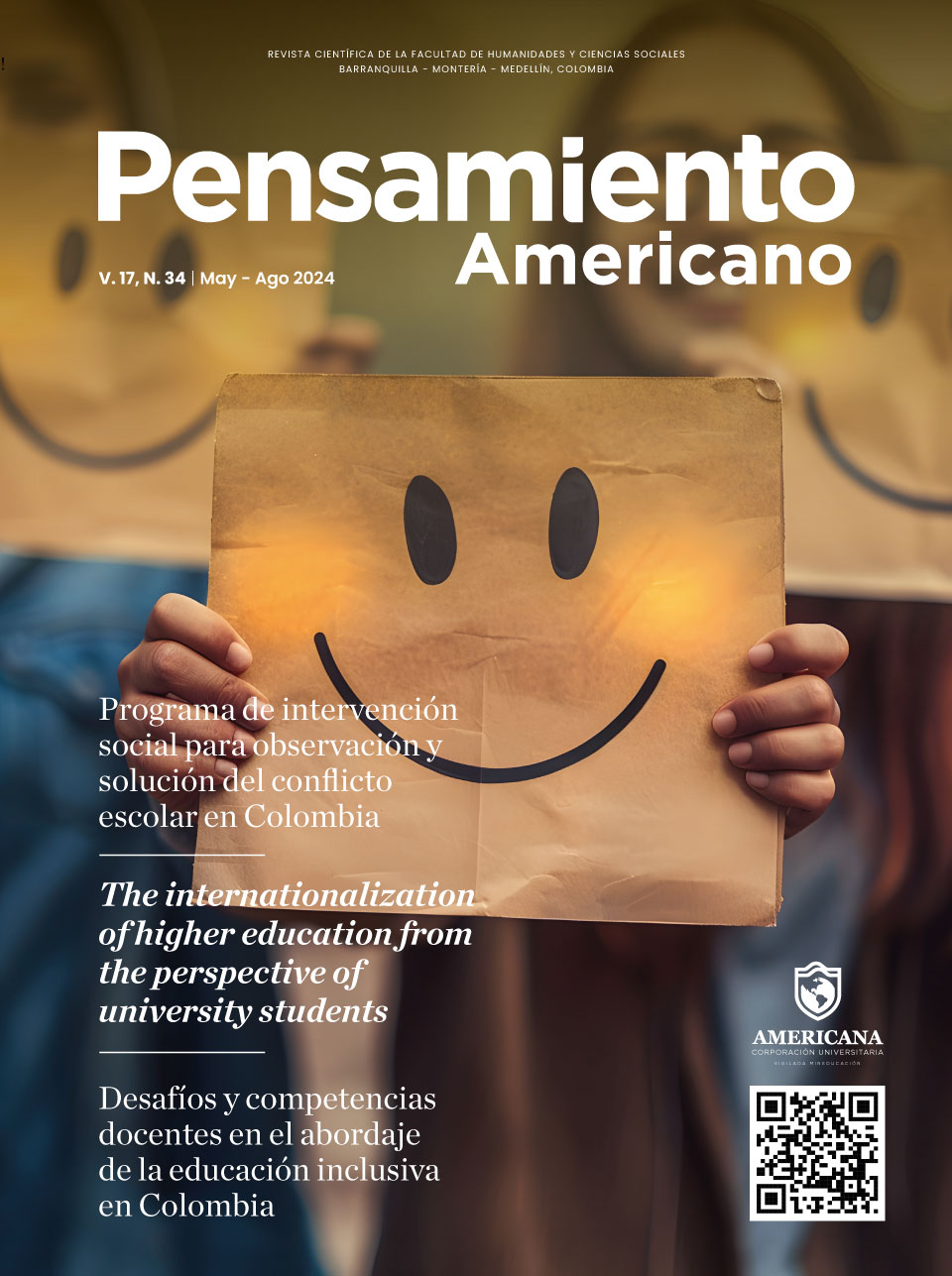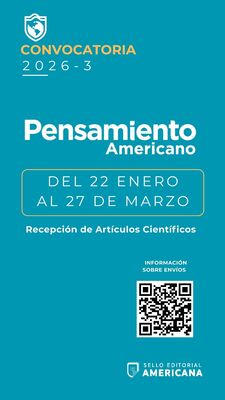Conception of copyrights related to music: analysis from its foundation
DOI:
https://doi.org/10.21803/penamer.17.34.723Keywords:
Artist, Author, Copyright, Professional morality, MusicAbstract
Introduction: This research article addresses the issue of copyright in the music industry through the conceptualisation of various notions that make up the spectrums of intellectual property rights. Objective: to analyse the doctrinal and legal role of copyright and related rights in the production of a musical work. Methodology: descriptive and explanatory, with an essentially qualitative basis for the way in which the information was collected and analysed. Results: This study made it possible to identify as a result a series of parameters that music as an artistic element has within the field not only of copyright, but also from a purely criminal perspective, in which it is identified as from the creation of a harmony or even a rhythm, the phenomenon of plagiarism can exist or be detected. Conclusion: It was identified that music as a product of human thought, the same as any other activity of the person, has a series of rights ranging from the patrimonial, to the moral, which are subject to legal protection.
Downloads
References
Kania. A. (2010) Silent music. The journaly of aesthetics and art criticism. The American Society for Aesthetics 68(4). 343-353.
Schimtz Vaccaro, C. (2005). Propiedad intelectual a la luz de los tratados de libre comercio. Editorial LexisNexis.
Congreso de la República (5 de febrero de 1993) Ley 44 de 1993. Por la cual se modifica y adiciona la Ley 23 de 1982 y se modifica la Ley 29 de 1944. [D.O. 40.740].
Congreso de la República (28 de enero de 1928) Ley 23 de 1982. Sobre derechos de autor. [D.O. 35.949].
Convenio de Berna. (9 de septiembre de 1886), Sobre la Protección de las Obras literarias y Artísticas.
Corte Constitucional (1996) Sala plena, Sentencia C-276 de1996, [M.P. Julio Cesar Ortiz Gutiérrez]
Bernal. D. & Conde, C. (2017) Los derechos morales de autor como derechos fundamentales en Colombia. Revista la propiedad inmaterial. 24 (1). 53 – 66.
Bejarano Cajibioy, H. F. (2020) El panorama de los derechos de autor en la industria musical desde la perspectiva del derecho penal. Trabajo de grado: Universidad Católica de Colombia.
Dirección Nacional de Derechos de Autor. (1993). Decisión Andina 351. Régimen común sobre derecho de autor y derechos conexos
Heredia Carroza, J., Palma Martos, L., & Aguado, L. F. (2020). Creación e interpretación en el marco de los derechos de autor: el caso de la música popular tradicional. 17 (21). 113-143.
Hurtado. F. R. (2017) Derechos de autor en medios audiovisuales en Colombia, un estudio comparado con España. Director: German Darío Flórez Acero. Trabajo de Grado. Universidad Católica de Colombia.
Ibarra Cano, L. M. (2017) Protección de los derechos de autor en la industria musical colombiana. Director: Johns Álvaro Martínez Vargas. Trabajo de grado: Universidad Libre de Colombia.
Flórez Acero, G. D., Salazar, S. & Durán, M. A. (2017). El concepto de plagio en la industria musical. En Flórez Acero, G. D. Salazar, S., Durán, M. A., Rodríguez
Flórez J. C. &. Sierra Marulanda. Ó. R. Propiedad intelectual, nuevas tecnologías y derecho del consumo: reflexiones desde el moderno derecho privado (pp. 67-93). Bogotá: Universidad Católica de Colombia.
González. J.C. (2015) Los pájaros de Olivier Messiaen. Mito Revista Cultural. 26 (1). 1-9.
Velázquez. J.D. (2004) ¿Qué son los derechos de autor y los derechos conexos? Director: Felipe Rubio Torres. Trabajo de Grado, Universidad de los Andes: Bogotá
Monroy Rodríguez J.C, Rojas Murcia. X, Sáenz Ardila. J, Arias Ospina. C. (2012) El derecho de autor y los derechos conexos en la industria de la musical. 1. Bogotá: Dirección Nacional de Derechos de Autor.
Sanabria, L. E. (2014) Conceptualización jurídica del plagio en Colombia. Revista Colombiana Cir. 29 (1). 88-97
Organización mundial de la propiedad intelectual. (1971). Convenio para la protección de los productores de fonogramas contra la reproducción no autorizada de sus fonogramas.
Organización Mundial del Comercio. (2019) ADPIC: Aspectos de los derechos de propiedad intelectual relacionados con el comercio. Acceso el 17 mayo de 2020, https://www.wto.org/spanish//tratop_s/trips_s/trips_s.htm
Medina Pérez de Ayala, I. (2021) La propiedad intelectual y el derecho musical. Director: Jesús Sieira Gil. Trabajo de grado: Comillas Universidad Pontificia.
Régimen Común sobre Derecho de Autor y Derechos Conexos. (17 de diciembre de 1993). Decisión 357 Cartagena.
Cabrera. S. A. (2014) El derecho de propiedad intelectual en la industria musical colombiana. Sujeto de derecho y protección jurídica. Revista de Derecho Privado. 52 (2). 1-27.
Downloads
Published
Versions
- 2024-09-09 (3)
- 2024-08-06 (2)
Issue
Section
License
Copyright (c) 2024 Pensamiento Americano

This work is licensed under a Creative Commons Attribution-NonCommercial-NoDerivatives 4.0 International License.
The author or authors of an article accepted for publication in the Journal Pensamiento Americano will transfer all of the patrimonial rights to the American University Corporation free of charge, within which are included: the right to edit, publish, reproduce and distribute both print media as digital, in addition to include in article in international indexes and / or databases, likewise, the Editorial Seal is authorized to use the images, tables and / or any graphic material presented in the article for the design of covers or posters from the same magazine. By assuming the patrimonial rights of the article, it may not be partially or totally reproduced in any printed or digital media without its express permission.
AUTHORITY ASPECTS
For the Pensamiento Americano Journal, all the authors of an article have made substantial contributions to the research and the manuscript, and they share the responsibility when the article presents errors, fraud in some way or violations of copyright.
After submitting an article, the journal does not accept the addition, deletion or change in the order of the authors, in addition we reserve the right to release the article when it has been submitted to the journal and under no circumstances will American Thought accept the article. withdrawal of an article during any phase of the editorial process





